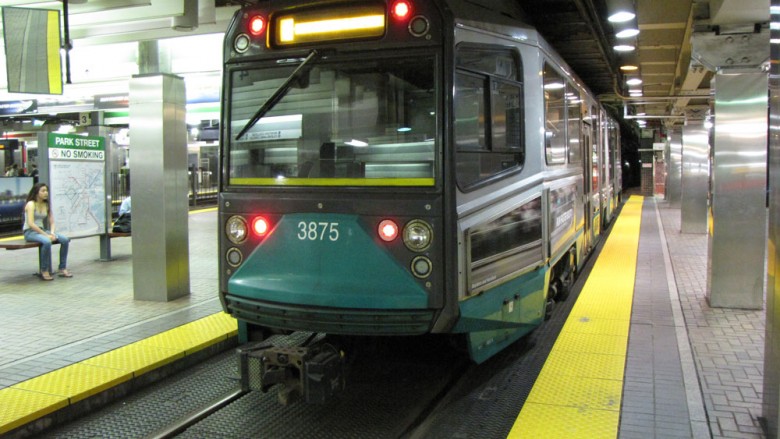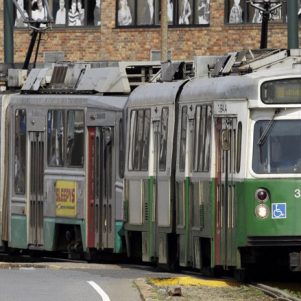Key house chair challenges MBTA’s portrayal of growing deficits
By State House News Service | October 1, 2015, 6:53 EDT
 A green Line trolley. (Photo courtesy of Wikipedia.org)
A green Line trolley. (Photo courtesy of Wikipedia.org) STATE HOUSE — As state transportation officials grapple with a yawning projected deficits and spotty performance at the MBTA, they confronted a philosophical disagreement on Wednesday from Rep. William Straus, the House’s pointman on transportation.
A report of the MBTA’s Fiscal and Management Control Board identified a growing deficit between the T’s statutory and self-generated revenues and its expenses, a gap set to hit $242 million in fiscal 2017.
Straus, a Mattapoisett Democrat and co-chair of the Transportation Committee, likened the MBTA, which has been regularly bailed out by lawmakers, to cities and towns that rely on regular appropriations through the state budget process, saying that is “not uncommon here or in other jurisdictions.”
[Hearing Audio: Part 1]
[Hearing Audio: Part 2]
“You and I have a fundamental, real big disagreement,” Straus told Transportation Secretary Stephanie Pollack. He said, “Structural deficit is a scary term and it suggests immediate action needs to be taken.”
Pollack interpreted Straus’s comments to be an endorsement of adding an “indefinite amount of additional assistance” on top of the state’s roughly $1 billion structural funding of the T.
“The fact that the Legislature provides additional contract assistance, in my view, is part of the regular funding process that has occurred for the T and in fact was part of the promise we made two years ago with the financing legislation,” Straus told reporters.
Sen. Thomas McGee, the co-chair of Transportation Committee and chairman of the state Democratic party, argued that the tax package lawmakers passed in 2013 was insufficient
McGee asked MBTA officials to make it more obvious that some of the deficit – which would balloon to $427 million in fiscal 2020 – is caused by moving employees off of the debt-financed capital budget and into the operating budget.
The control board and T officials appeared before the Transportation Committee for an oversight hearing following disclosures in recent weeks of a $7.3 billion state-of-good-repair backlog, a workforce where 31.7 percent of the employees are certified for Family and Medical Leave Act absences, and a system that experienced chronic failure last winter.
Established in the state budget, the control board earned praise from Conservation Law Foundation official and transit advocate Rafael Mares, who told the News Service the recently released 60-day report is “refreshingly honest about the MBTA’s challenges,” and said it seems to have “avoided any pressure to try to score political points by overstating problems or using misleading statistics,” which he said were “two unproductive approaches we have unfortunately seen in the recent past.”
Monica Tibbits-Nutt, a member of the control board and executive director of the 128 Business Council, updated lawmakers on her efforts to produce interactive data on system on-time performance, and to measure the crowd size at MBTA stations.
“Crowding is a really big deal,” said Tibbits-Nutt, who said she sometimes is unable to board a train at the Harvard Square Red Line during her commute. The key might involve using security cameras or new technology, said Tibbits-Nutt, who said she is looking for a solution to measuring crowds by spring.
Brian Lang, president of hotel and food service union Unite Here Local 26 and a member of the control board, said there is no manager in charge of employee leave or recruitment, and one third of the workforce is eligible for retirement in five years, potentially creating 2,000 openings. Lang said the board had been unable to obtain “simple” staffing information about the T.
“Behind these numbers is a broken administrative system,” Lang said, expressing optimism that hires would be made and the system would improve. He said, “There has been a new and positive outreach made to the unions.”
Sen. Robert Hedlund, a Weymouth Republican running for mayor, asked whether any of the management changes had resulted in “efficiencies.”
Management has split up into three positions the role held previously by General Manager Beverly Scott, who submitted her resignation during some of the worst winter weather earlier this year. Separate officials are now in charge of day-to-day operations, reforming the system and overseeing rail.
Joe Aiello, the chairman of the control board and an executive at Meridiam Infrastructure, said it would be “impossible” for one person to try to handle the responsibilities of running and reforming the T, and said the MBTA had suffered under “a number of years of underinvestment.”
“People are pretty beat up,” said Aiello, who identified a lack of a “feeder system” into management and said the aim is to build the MBTA into “one of the premier systems in the United States.”
Lang said 64 new assistant conductors would go to work on the commuter rail in December, with the aim of allowing faster boarding and better fare collection. Pollack said the T is using penalty dollars from commuter rail operator Keolis Commuter Services to finance the additional conductors and will assess whether they improve performance.
Rep. Evandro Carvalho, a Dorchester Democrat, asked whether the T would fix a bridge in his district, and Pollack responded that bridges would “definitely be a focus” when the T and the Massachusetts Department of Transportation release 5-year capital plans, likely sometime in January.
“MBTA bridges are a real problem,” said Pollack, who said they were excluded from the accelerated bridge program that has financed bridge rehabs and replacements for several years.
— Written by Andy Metzger
Copyright State House News Service










